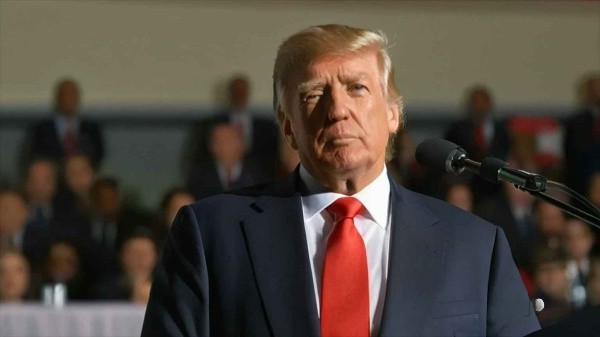Iran’s Plan to Strike Back Against the U.S.
Iran’s Military Preparations Following U.S. Attacks
Loading...

Republican presidential candidate Donald Trump raises the idea of making a deal with Iran aimed at ending hostilities if he is elected president this fall.
A Shift in Strategy
In a recent statement, Republican presidential candidate Donald Trump has suggested that he would be open to negotiating a deal with Iran if he wins the upcoming election. This marks a notable shift in his approach to foreign policy regarding the Middle Eastern nation, which has been a focal point of tension in U.S. relations. Trump emphasized the necessity of reaching an agreement, stating, “We have to make a deal, because the consequences are impossible. We have to make a deal.” However, he did not provide specific details about what such a deal might entail.
The Context of Trump's Remarks
Trump's comments come in the wake of his controversial decision to withdraw from the Iran nuclear deal in 2018. This agreement, originally brokered by the Obama administration along with several major world powers, aimed to limit Iran's nuclear capabilities in exchange for sanctions relief. Since the U.S. exit from the deal, Iran has resumed enriching uranium to levels that could potentially enable the development of nuclear weapons, raising alarms among international observers and policymakers.
The former president's willingness to consider a new deal reflects a recognition of the escalating tensions and the potential consequences of continued hostilities. The geopolitical landscape surrounding Iran is complex, with various factors influencing its nuclear ambitions and regional behavior. Trump's approach suggests a desire to re-engage diplomatically, albeit without outlining a clear strategy or framework for negotiations.
Implications of a New Deal
If Trump were to be elected and pursue a new agreement with Iran, it could have significant implications for U.S. foreign policy and international relations. A successful negotiation might ease tensions in the Middle East and reduce the risk of military conflict. However, the challenges of reaching a consensus with Iran remain substantial, given the historical mistrust and differing objectives between the two nations.
Critics of Trump's previous handling of Iran argue that his withdrawal from the nuclear deal has only exacerbated the situation, leading to increased instability in the region. They caution that any new negotiations would require careful consideration of Iran's actions since the original deal's collapse, including its advancements in nuclear technology and its involvement in regional conflicts.
The Road Ahead
As the election approaches, Trump's comments on Iran will likely become a focal point in the broader discussion of his foreign policy agenda. Voters will be keen to understand how he plans to navigate the complexities of international diplomacy, particularly with a nation that has been a longstanding adversary. The potential for a new deal with Iran raises questions about the balance between diplomatic engagement and the need for stringent measures to ensure compliance with international norms regarding nuclear proliferation.
In conclusion, Trump's suggestion of a deal with Iran signals a possible shift in his foreign policy strategy, emphasizing the need for negotiation in the face of escalating tensions. As the political landscape evolves, the implications of such a stance will be closely monitored by both supporters and critics alike. The outcome of the upcoming election could determine the future of U.S.-Iran relations and the broader stability of the Middle East.
Editor
Iran’s Military Preparations Following U.S. Attacks
Troops remain in five strategic locations, raising fears of renewed tensions and long-term occupation.
Opposition forces have taken control of the capital after a significant offensive. Here is how it unravelled.
